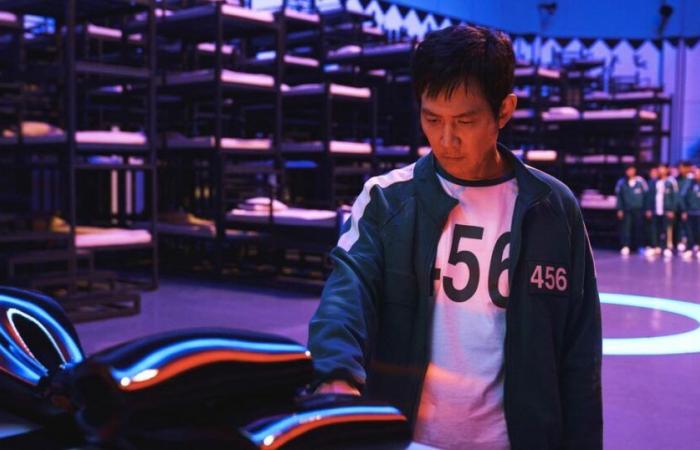Three years after the global phenomenon which followed the launch of this Korean series featuring children’s games in an ultra violent version, “Squid Game” has been back on Netflix since December 26. A second season which continues to criticize capitalist society excessively.
The events take place three years after those of the first season of “Squid Game”. After winning the game, Seong Gi-hun hopes to enjoy life by going to the United States. Unfortunately, a series of incidents will push him to reconsider his plans and re-enroll in the deadly game.
The second season uses the same mechanics as the first: a big man locks up desperate people, with the choice of death or money. “Whatever we think of this new season, it obviously does not have the same resonance and does not cause the same shock as the first”, explains in the 7:30 p.m. of December 29 Nicolas Dufour, journalist and series specialist for the newspaper Time.
“It’s always this oscillation between the strong Orwellian hierarchy and the dereliction of humanity; the fall of the values of society and civilization,” he explains. Ultimately, man is a wolf for ‘man all the time.’
External content
This external content cannot be displayed because it may collect personal data. To view this content you must authorize the category Social networks.
Accept More info
A critique of capitalism
Main character of “Squid Game”, Seong Gi-hun is a divorced father and former worker thrown out on the street by an automobile group, Dragon Motors. Even if it is fiction, the director and screenwriter of “Squid Game”, Hwang Dong-hyuk, tells AFP that he was inspired by a real chapter in the sometimes bloody history of social conflicts. in South Korea: the occupation of the Ssangyong factory in Pyeongtaek, near Seoul, in 2009.
“I wanted to show that, in today’s world, any member of the middle class can fall to the bottom of the economic ladder overnight,” he explains. Dragon Motors, the former employer of the character Gi-hun, is also a clear reference to Ssangyong (“twin dragon” in Korean), a real company having laid off 40% of its staff in 2009.
A factory occupation and 77-day strike followed, ending in a violent battle between strikers armed with slingshots and steel pipes and police using rubber bullets, Tasers and helicopters spraying tear gas. Many trade unionists were beaten up.
From South Korea to the West
The conflict did not end there. Five years later, union leader Lee Chang-kun remained perched atop one of the factory’s chimneys for 100 days to denounce a ruling ruling in favor of Ssangyong against the strikers. He is then supplied with food using a basket hung on a rope and is prey to hallucinations – a rope from his tent transforming, according to him, into a snake.
“The series takes an extremely harsh look at society and South Korea has, at this level perhaps, something maximalist, but which we know here too. For example, the competition for a job, for a better salary, to try to climb up in society in one way or another”, says Nicolas Dufour.
TV subject: Gilles de Diesbach
Web adaptation: Myriam Semaani with afp
“Squid Game”, season 2, by Hwang Dong-hyuk, with Lee Jung-jae. Watch on Netflix since December 26, 2024.






